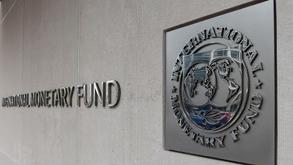 In this March 27, 2020 photo, an exterior view of the building of the International Monetary Fund (IMF), with the IMG logo, is seen in Washington, DC. (Olivier DOULIERY / AFP)
In this March 27, 2020 photo, an exterior view of the building of the International Monetary Fund (IMF), with the IMG logo, is seen in Washington, DC. (Olivier DOULIERY / AFP)
SINGAPORE – The International Monetary Fund (IMF) said in a report released on Friday that economic growth in the Asia and Pacific region is expected to slow down in 2022 and 2023.
International Monetary Fund cut growth forecasts for Asia and the Pacific to 4 percent this year and 4.3 percent next year, down by 0.9 and 0.8 percentage points, respectively, compared to the April forecasts
This reflects headwinds from several aspects, including global financial tightening and the Russia-Ukraine conflict, according to the report.
ALSO READ: IMF official sees increased downside risks for Asia economy
Asia's strong economic rebound early this year is losing momentum, with a weaker-than-expected second quarter, said the IMF.
It cut growth forecasts for Asia and the Pacific to 4 percent this year and 4.3 percent next year, down by 0.9 and 0.8 percentage points, respectively, compared to the April forecasts.
The levels in April's outlook were well below the 5.5 percent average over the last two decades.
However, Krishna Srinivasan, director of the IMF's Asia and Pacific Department, believed that "Asia remains a relative bright spot in an increasingly dimming global economy."
READ MORE: IMF cuts Asia's growth forecast, warns of pandemic-driven risks
The report noted that the US Federal Reserve has become much more aggressive in tightening its monetary policy as the United States inflation remains stubbornly high. This has translated into tighter financial conditions for Asia.
Most but not all countries in Asia have seen a deterioration of their terms of trade, and this has been an important factor behind currency depreciations so far this year, it stated.
Srinivasan said that for policymakers, further tightening of monetary policy will be required to ensure that inflation returns to target and inflation expectations remain well anchored.
ALSO READ: IMF: China can top up stimulus if virus outbreak hurts growth
He also suggested that fiscal consolidation is needed to stabilize public debt and support the monetary policy stance.


